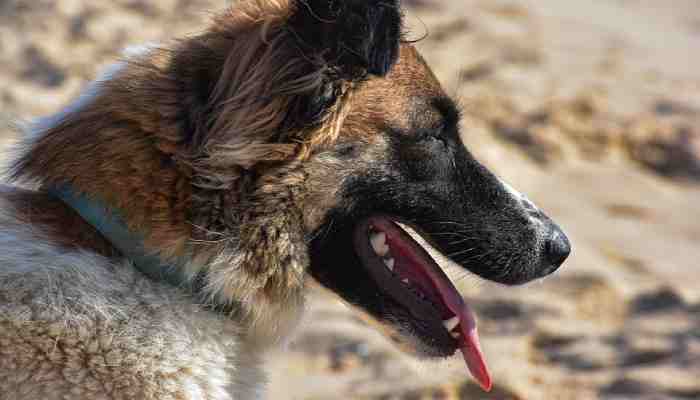As our furry friends age, it’s important to pay close attention to their overall health, including their dental health. Just like humans, senior dogs are at risk for developing dental diseases that can lead to serious health issues. Unfortunately, dental disease is one of the most common health problems in dogs, and it’s estimated that by the age of three, most dogs will already have some degree of dental disease.
I. Causes of dental disease in senior dogs
Dental disease is a common health issue in senior dogs, and it can cause discomfort, pain, and even serious health complications if left untreated. While dental disease can develop for a range of reasons, understanding the specific causes can help dog owners take proactive steps to prevent and treat the condition.
Plaque and tartar buildup
Plaque is a sticky film that forms on the teeth when bacteria in the mouth combine with food particles. If plaque is not removed through regular brushing and cleaning, it can harden into tartar, which can only be removed by a veterinarian. Tartar buildup can cause gum irritation and inflammation, which can lead to gum disease and tooth loss.
Genetics
Some breeds of dogs are more prone to dental disease than others due to genetics. For example, smaller breeds like Chihuahuas and Yorkshire Terriers are more susceptible to dental problems because their teeth are often crowded together, making it easier for plaque and tartar to accumulate. Dogs with shorter snouts, like Pugs and Bulldogs, are also more prone to dental issues because their teeth are often misaligned.
Diet
Diet is a significant contributor to dental disease in senior dogs. Certain foods can cause plaque buildup and contribute to the growth of harmful bacteria in the mouth, which can lead to gum disease, tooth decay, and other dental problems. Foods that are high in carbohydrates or sugars, such as many commercial dog foods and treats, can be particularly problematic for dental health. These types of foods can provide a breeding ground for bacteria, leading to the formation of plaque and tartar on the teeth. In addition, some dogs may have dietary restrictions or medical conditions that can impact their dental health. For example, dogs with kidney disease may require a specialized diet that is lower in protein and phosphorus, which can impact the health of their teeth and gums.
II. Signs and symptoms of dental disease in senior dogs
It’s important for pet owners to be aware of the signs and symptoms of dental disease in senior dogs so that they can provide prompt treatment and prevent further complications.
One of the most common signs of dental disease in senior dogs is bad breath, or halitosis. If your dog’s breath smells unusually foul, it could be a sign of bacterial buildup in the mouth. Other signs of dental disease can include discoloured teeth, swollen or bleeding gums, tartar buildup on the teeth, loose or missing teeth, and a reluctance to eat or chew.
Discoloured teeth can also be a sign of dental disease in senior dogs. Teeth may appear yellow or brown and can indicate the presence of plaque or tartar buildup. Tartar buildup can also cause gums to become inflamed and swollen, leading to bleeding and discomfort for your dog.
Drooling is another symptom of dental disease in senior dogs. Excessive drooling can be a sign of pain or discomfort in the mouth, which can be caused by gum disease, tooth decay, or other dental issues.
Difficulty eating or chewing is also a sign of dental disease in senior dogs. If your dog is having trouble eating or appears to be in pain while chewing, it could be a sign of dental pain or discomfort. This can be particularly concerning if your dog is losing weight or not getting the nutrition they need due to difficulty eating.
III. Risks of untreated dental disease in senior dogs
Untreated dental disease in senior dogs can lead to a variety of serious health problems that can impact their overall well-being. One of the most common risks of dental disease in senior dogs is tooth loss. If dental disease is left untreated, it can cause the teeth to become loose and eventually fall out. This can make it difficult for your dog to eat and lead to further complications.
Gum disease is another serious risk of untreated dental disease in senior dogs. Gum disease, also known as periodontal disease, is caused by bacterial infection in the gums and can cause inflammation, bleeding, and pain. Left untreated, gum disease can progress and cause damage to the bones and tissues that support the teeth.
Untreated dental disease can also lead to the development of abscesses in the mouth. An abscess is a pocket of pus that can form in the gums, teeth, or jawbone. Abscesses can cause significant pain and discomfort for your dog and can even lead to the spread of infection to other parts of the body.
Perhaps most concerning, untreated dental disease can lead to the development of systemic infections in senior dogs. Bacteria that are present in the mouth can enter the bloodstream and cause infections in other parts of the body, such as the heart, liver, and kidneys. These infections can be life-threatening and can significantly impact your dog’s quality of life.
IV. Prevention and treatment of dental disease in senior dogs
Prevention and treatment of dental disease in senior dogs is critical to maintaining your furry friend’s health and well-being. There are several steps that pet owners can take to help prevent dental disease from developing and to treat existing dental problems.
Regular dental check-ups with a veterinarian are essential for maintaining good oral health in senior dogs. During these check-ups, the vet can examine your dog’s teeth and gums for signs of dental disease and recommend appropriate treatment. They may also recommend regular professional dental cleanings to help remove tartar and plaque buildup.
Brushing your dog’s teeth at home is another important step in preventing dental disease in senior dogs. Using a dog-specific toothbrush and toothpaste, you can help remove plaque and bacteria from your dog’s teeth and gums. It’s important to start slowly and make tooth brushing a positive experience for your dog.
Dental chews and treats can also be helpful in preventing dental disease in senior dogs. Chews that are specifically designed to clean teeth and reduce plaque buildup can be a tasty and effective way to maintain good oral hygiene.
In some cases, professional dental cleaning may be necessary to treat existing dental disease in senior dogs. This involves a deep cleaning of the teeth and gums, often under anaesthesia, to remove tartar and bacteria. Professional dental cleaning can help treat and prevent more serious dental problems from developing.
Dental health is just as important for senior dogs as it is for humans. Untreated dental disease in senior dogs can lead to a variety of serious health problems, including tooth loss, gum disease, abscesses, and systemic infections. By taking steps to prevent dental disease and seeking prompt treatment for any issues, pet owners can help ensure that their senior dogs remain healthy, happy, and pain-free in their golden years. Don’t forget to prioritize your senior dog’s dental health, as it can make all the difference in their quality of life.


